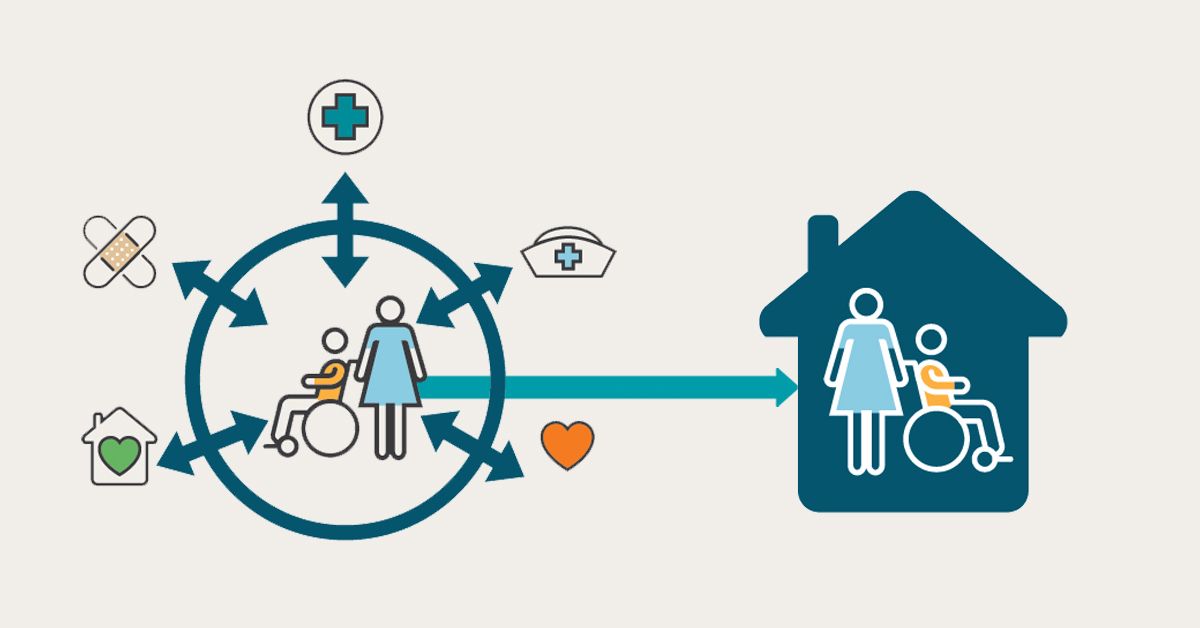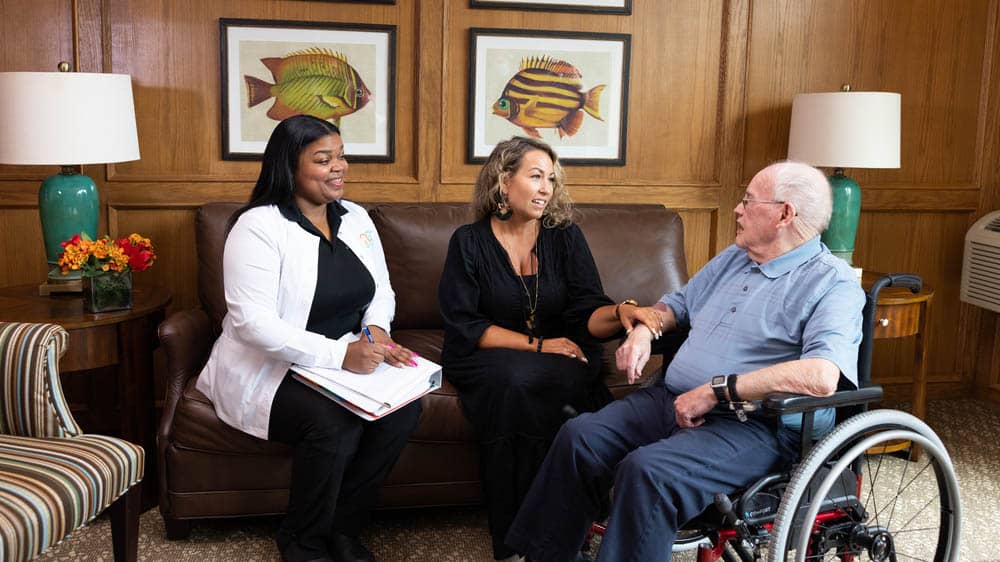

10 Questions to Ask Before Your Hospital Discharge
As you prepare to be discharged after a hospitalization, the thought of recuperating at home may be overwhelming. These 10 questions will help you get the information you need to make your recovery at home as successful as possible. You likely will have more questions about your recovery, so be sure to ask all your questions when speaking with your medical team.
1. Is there someone who will advocate for my care as I transition home?
If you do not have a consistent team of family caregivers and friends to assist you at home, consider professional in-home care and assistance such as RightTransitions® from Right at Home. The hospital may also assign a social worker or case manager to advocate on your behalf to find out about insurance and community services that are available after your hospital stay.
Someone may need to make a home visit to make sure the environment is safe for return before the actual discharge. If you were admitted to the hospital because of a fall, has the hazard in the home been removed or fixed (e.g., loose carpeting, clutter, cords, etc.)? Is the heating or air conditioning working? Are grab bars installed in the bathroom? The coordination of a home safety assessment and continued care services may be vital in your smooth and safe transition back home.
2. Do I need any kind of care after my hospital stay?
A red flag that you may need care at home after your hospitalization is if you have not walked or if you are still feeling weak and wonder, “Am I strong enough to go home?”
Even though you may appear alert and strong in the hospital, your medical team needs to assess if you need transition care and at-home care services. Communication and coordination between the hospital and family or next facility is key. Will you be homebound? Will you need home healthcare to help with a medical condition or doctor-directed therapy?
The hospital team looks at a number of factors before your discharge home or to another care facility. Your medical team will evaluate what you can do in the hospital to ensure that you can do similar activities at home. How far can you walk? Can you get in and out of the bathroom and shower? Can you walk up and down the steps? If you have chronic obstructive pulmonary disease (COPD), your physician may put you on oxygen support. Your activity level can slow down and you might get tired doing certain things. The hospital staff will look at how you are moving around in the hospital and consider if you need assistance at home.
3. What medications should I take, and what medication schedule should I follow at home?
Medications bring up many questions, and they should. Properly managing your medications is one of the most important steps to recovery. Before your discharge, your medical team should provide you a written list of all your medications. Be sure you have provided a list of all medications, both prescription and over-the-counter, that you were taking up to the point of your hospitalization. Your doctors will let you know if any current medications should be stopped or changed. Before you leave the hospital, it’s important to ask these medication questions: Are my regular medications the same or have they changed? What is my medication schedule? Do I have the medications that I need before I go home? Have the prescriptions been called into the pharmacy? Who is going to pick up the prescriptions? When is my next dose? Are there any incompatibilities with the medications and my diet?
Since medications can look alike or have names that sound alike, it is possible to take the wrong prescription once the medications are out of their bottles. A duplication of generic vs. brand name medications can also add confusion. As for new medication prescriptions, clarify with your doctors if you are done once they run out or if you should refill them indefinitely.
4. What activities am I allowed to do or what activities should I avoid?
A few days in advance of a hospital discharge, nurses and discharge planners may assess your ability to walk and any progress you have made with physical or occupational therapy — can you safely ascend the steps to get into your house or stairs inside the house? Can you get in and out of the bathtub at home? What can be done to prevent falls? Can you fix your own meals? Can you reach to wash and dry your back? If you have had a recent surgery, can you put on your own socks? Do you need assistance with any other activities of daily living?
Understanding any activity limitations before leaving the hospital will help you prepare for any in-home care you may need to help ensure the best recovery.
5. Do I have any dietary restrictions or nutritional requirements?
You may not have an appetite since your hospitalization, or perhaps you haven’t been eating solid food for a few days. Proper nutrition that supports your recovery or the diagnosis of an illness should be discussed with your medical team before leaving the hospital. If you have any new or changing dietary needs, what are they, and how can you make sure your nutrition at home supplements them? Some people have congestive heart failure and need to lower their sodium intake. Others are on dialysis and need a renal diet. In addition to understanding the foods and fluids to consume, it’s important to accurately gauge your ability to purchase and prepare meals and snacks on your own, to determine if you will need assistance.
6. What medical equipment will I need at home?
It’s been said that for every day a person is in the hospital, they get one day weaker. If you have been on weeks of bed rest, it can take some time to regain strength at home. Will you need a cane, walker or wheelchair? Have you practiced in the hospital with these assistive devices? If you are sent home with a nebulizer or infusion tubing, do you know how to use the product and keep it clean to prevent infection? Be sure to practice with your at-home medical equipment and supplies in the hospital before discharge.
7. Do I have follow-up medical appointments, and when are those?
Before you go home from the hospital, it’s important to know what follow-up appointments will be needed. You may need to see your general practitioner, a new or existing specialist, or a physical therapist. Understand if appointments have already been scheduled, or if you will need to coordinate the appointments. Be sure to get the contact information for any doctor responsible for your follow-up care.
8. What resources are available to me to help with my care at home?
Speak with the hospital discharge planner or social worker about any resources that may help you recover at home. Some resources include Area Agencies on Aging, Meals on Wheels, Right at Home, and the Supplemental Nutrition Assistance Program (SNAP, formerly known as food stamps). Medicare.gov is a good place to compare services offered through local care facilities.
9. Will I be hearing from anybody else from the hospital, and when would I expect to hear from them?
Many hospitals assign a patient navigator to help patients with the transition back home. Hospitals also conduct post-discharge phone calls to check on patients. It helps to ask the hospital when they may be calling if you do not usually answer the phone from an unknown caller ID. Communication with your medical team during care transitions plays an important role in your recovery and overall health going forward.
10. What red flags or changes in my condition should I watch for?
Ask your medical team what to expect over the course of your recovery. While every patient is different, your doctors should be able to give you an idea of the length of your recovery and any milestones along the way. Before going home, it’s important to understand what you should be looking for. What are signs that your recovery is going well? Are there any signs or symptoms that would indicate you need additional medical attention? What symptoms would warrant a visit to the emergency room, and which symptoms can wait to be discussed with the doctor?







